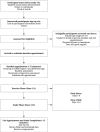Adolescents' Daily Lives (ADL) project: an intensive longitudinal design study protocol examining the associations between physical literacy, movement behaviours, emotion regulation and mental health
- PMID: 39572095
- PMCID: PMC11580315
- DOI: 10.1136/bmjopen-2024-094225
Adolescents' Daily Lives (ADL) project: an intensive longitudinal design study protocol examining the associations between physical literacy, movement behaviours, emotion regulation and mental health
Abstract
Introduction: Adolescence represents a critical developmental period, with changes in emotional regulation capacities influencing physical and mental health. With less than 6% of Canadian youth currently meeting the 24-hour movement guidelines for physical activity, sleep and sedentary behaviour, there is an urgent need to understand the potential association between movement behaviours, physical literacy, emotional regulation and mental health during adolescence. Additionally, there is a need to better understand these associations among equity-deserving groups. We developed the Adolescents' Daily Lives (ADL) project to identify how, when, under what contexts and to whom to promote healthy engagement in movement behaviours to optimise youth mental health.
Methods and analysis: For the ADL project, we will employ a 14-day intensive longitudinal design to investigate the associations between physical literacy, movement behaviours, emotion regulation and mental health among a diverse sample of 120 adolescents (ages 13-17 years) living in the Greater Victoria Area, British Columbia, Canada. A comprehensive baseline survey and movement competence test, assessing physical and mental well-being, 24-hour movement behaviours (ie, physical activity, sleep and sedentary behaviours) and physical literacy, will be accompanied by daily diary surveys and accelerometer-based movement tracking (ie, Fitbit Inspire 3) to assess daily fluctuations in movement behaviour, emotional regulation and mood. Multivariate analyses, including multilevel modelling, multilevel structural equation modelling and Bayesian hierarchical continuous-time SEM, will be used to model the repeated measures data and understand the simultaneous variations in daily movement behaviours, emotion regulation and mental health.
Ethics and dissemination: The ADL project received ethical approval from the University of Victoria Behavioural Research Ethics Board (protocol #22-0262). Study participation is voluntary, and data collection will be anonymised to protect participant privacy and confidentiality. Research findings will be shared through academic publications and conference proceedings. Through knowledge mobilisation resources, cocreated with the youth community advisory board, relevant findings will be shared directly with the wider community of adolescents.
Keywords: Adolescents; Child; Exercise; MENTAL HEALTH.
© Author(s) (or their employer(s)) 2024. Re-use permitted under CC BY-NC. No commercial re-use. See rights and permissions. Published by BMJ.
Conflict of interest statement
Competing interests: None declared.
Figures
Similar articles
-
24-hour movement behaviours in the early years, potential behavioural determinants and prospective associations with growth, motor and social-emotional development: the My Little Moves study protocol.BMJ Open. 2024 Oct 22;14(10):e081836. doi: 10.1136/bmjopen-2023-081836. BMJ Open. 2024. PMID: 39438091 Free PMC article.
-
Adherence to 24-hour movement guidelines and associations with mental well-being: a population-based study with adolescents in Canada.BMC Public Health. 2025 Mar 6;25(1):749. doi: 10.1186/s12889-025-21857-7. BMC Public Health. 2025. PMID: 40050844 Free PMC article.
-
Longitudinal association between movement behaviours and depressive symptoms among adolescents using compositional data analysis.PLoS One. 2021 Sep 1;16(9):e0256867. doi: 10.1371/journal.pone.0256867. eCollection 2021. PLoS One. 2021. PMID: 34469485 Free PMC article.
-
Combinations of physical activity, sedentary time, and sleep duration and their associations with depressive symptoms and other mental health problems in children and adolescents: a systematic review.Int J Behav Nutr Phys Act. 2020 Jun 5;17(1):72. doi: 10.1186/s12966-020-00976-x. Int J Behav Nutr Phys Act. 2020. PMID: 32503638 Free PMC article.
-
Canadian 24-Hour Movement Guidelines for Adults aged 18-64 years and Adults aged 65 years or older: an integration of physical activity, sedentary behaviour, and sleep.Appl Physiol Nutr Metab. 2020 Oct;45(10 (Suppl. 2)):S57-S102. doi: 10.1139/apnm-2020-0467. Appl Physiol Nutr Metab. 2020. PMID: 33054332
References
MeSH terms
LinkOut - more resources
Full Text Sources
Medical


